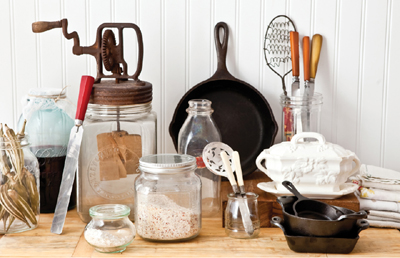

I’ve been cooking as a professional for a little more than fifteen years, but my passion actually started when I wasn’t tall enough to reach the counter in my grandmother’s country kitchen. I called her Meme, and she was the light of my life. The kitchen never really changed much. There never was enough space for everything. The overhead light hummed. My grandmother’s recipes were posted on the inside of the cabinet, some written in her old-fashioned, loopy, spidery penmanship directly on the wood.
My grandmother and I spent hours together in that kitchen. There are photos of me as young as three years old standing on a stool “helping.” As dinner cooked, we’d roll out the biscuits, and she’d let me make a handprint with the scraps of dough. The tiny fingers on my biscuit would cook very dark in the heat of the oven, taking on a slightly bitter, almost nutty taste. I know that’s where my love for cooking took root, working at her side on her linoleum countertop, in the gentle breeze of the oscillating fan.
Oh, my grandmother could cook. Her pound cake was legendary. She’d wake in the early morning before the heat of the day and prepare fried chicken, buttermilk biscuits, old-fashioned butter beans, creamed corn, okra, and tomatoes.
Many of the vegetables were grown in my grandfather’s garden. My grandfather Dede was a patient man. She would call outdoors and make the man take his shirt off so she could wash it. That never made a lick of sense to me. He’d mumble quietly under his breath “Lawd, have mercy,” but he would have moved a mountain range for her.
The very last time I saw my grandmother was on Mother’s Day in 2000. She had a sore throat, went to the doctor, and was diagnosed with cancer. She was 91 and conceded defeat when she heard that ugly word. When I returned to that simple country kitchen, our tables were turned, and I cooked for her. There’s still hardly a day that goes by that I don’t think of her. I often wish I could be in the kitchen with her, smelling her chicken frying just one more time.
My mother, Virginia, known as Jenny, grew up in Columbia County, Georgia. She returned there almost twenty-five years ago and now lives less than a mile from the house where she was raised. When asked where I am from, I generally reply, “My family is from Evans, Georgia.” I haven’t lived there since I was three years old, and I’ve lived dozens of places since. However, home is far more complex than a mailing address. My deep roots in the South and family history continually help me define my journey, what I will be, and where I will go.
My maternal grandparents, Sam and Louise Baston, bought fifty acres near Evans, Georgia, in 1938. She was the lady and he was the tall, handsome, strapping country boy with dark hair and crystal clear blue eyes. He swept her off her feet, they fell in love, and scandalously, they eloped. (I feel compelled at this point to point out for my grandmother’s honor that their first child was not born shortly thereafter.) Together they made a family, helped start a community, built a church, and most importantly, left a long-lasting legacy of what home really is.
I spent much of my childhood with my grandparents. Dede always seemed to be working outdoors. There are photos of me as a toddler, chubby legs covered in dirt from tagging along behind him in the garden. He, my sister, and I would pick berries in the woods and bring them to Meme to make Sweet Biscuits with Stewed Blackberries or some form of cobbler. I remember being in the steamy kitchen with my apron-clad grandmother, before central heat and air was installed, listening to her cook, and taking in every last sight and scent. The gentle burbling of Meme’s Chicken and Rice in the cast-iron Dutch oven; the sweet, sticky cake batter licked from the spatula; the gentle hum of the electric mixer beating the icing for Dede’s Burnt Caramel Cake and the pitched whistle of the pressure cooker emitting the meaty smell of bacon and green beans fresh from the garden are the tastes, smells, and sounds of my childhood.

When I was a teenager, I didn’t hang out in the Dairy Queen parking lot with the other kids on Friday nights. I stayed at home in the kitchen with Mama. My parents divorced the summer between my junior and senior year. That same summer, the school I attended closed. I was sixteen, and it was hard. Mama and I leaned on each other, and it was then that our “grown-up” friendship really started as we spent time in the kitchen together. Instead of attending my senior year of high school, I started college. Mama never let on she was worried. She believed in me, and if she had any hesitation about her sheltered, bookish daughter starting college at sixteen, she never said a word.
After a great start, I sputtered a bit and got lost. I realized the one constant, the one place I always sought, whether a scared teenager leaving Mama, or in a flat in London, or in Athens, Georgia, at my college commune-of-sorts, or as a lonely university grad in Charleston, South Carolina, the one place that had been my constant home was the kitchen. That realization started me on my way.
My first job cooking was on a TV cooking show with Nathalie Dupree. I learned to make Sally Lunn Bread and enjoyed the infinite pleasure of feeling crust tearing beneath my bite to reveal the moist, yeasty crumb inside. I attended culinary school at L’Academie de Cuisine in Bethesda and was taught to make earthy, fragrant soups. I tasted delicate, clear consommés that belied the complexity within. I discovered an infinite world of sauces beyond the familiar gravy, and learned about reductions, seasoning, and balance. I remember my first taste of the slick, iron-rich demi-glace and the brittle, bony minerality of court-bouillon.
Shortly thereafter I moved to France. I was supposed to be at La Varenne in Burgundy with Anne Willan for three months and was there for nearly three years. At La Varenne I felt like I actually tasted the warm, grassiness of butter for the first time. I explored cheeses I had never known—some heady and thick with animal aroma, others delicate, pure suspensions of fresh, sweet milk. The vegetables from the garden reminded me of home: voluptuous tomatoes bursting with savory flavor; sweet, tender squash; and musky, honeyed melon fully ripened by the hot summer sun.
My kitchen home grew increasingly larger; I felt I’d been given keys to the culinary castle. Learning through the French emphasis on basic, fundamental techniques, I tasted and saw food as I had never seen it before. I also began to realize how important those years of learning by Meme’s and Mama’s sides had been.
Returning stateside, I was the TV kitchen director for Bobby Flay, then Martha Stewart. With Epicurious television I ate freshly caught grilled octopus on an Aeolian beach, the fire spitting steam and seawater. I made pungent, eye-watering moutarde au vin in Dijon, and pressed deliciously biting olive oil with a media heiress in Sonoma. During my extended time in Europe, while traveling in the United States and abroad, and while living in New York, I was exposed to brilliant food, simple to complex creations—made in people’s homes, through my work, or prepared in restaurants by some of the world’s most celebrated chefs.
Then, on 9/11, I was trapped in Manhattan as the towers burned. People were huddled around cars with doors and windows open at every street corner, listening to the radio. The sound of sirens and the gnawing pull of fear were omnipresent. At one point I could see the towers smoldering and smoking against the cerulean blue sky, and then they were gone. Just gone. In the economic aftermath, I lost my job with Epicurious. Months later, walking down the West Side Highway with tears streaming down my cheeks, the sounds of sirens still permeating the air, I realized I wanted to go home after nearly ten years away from the South.
Like many expatriates, I returned home with a better sense of place than I would have ever had if I had never left. In my travels, I had built upon what my grandmother and mother had taught me, a solid repertoire of basic fundamental techniques. My eyes had been wondrously opened to just how brilliant the world of food—and home—could be. I continue my journey, still building my collection of stories with every bite, every word, every scent.
I’ve always devoured books and still do. Words are magic to me. What I hope to share with you is a collection of recipes and recollections that you will devour, that you will find magical. I am offering a body of basic recipes that can stand on their own, but they can be transformed to brilliant by a short recipe, presentation tip, or technique—all accomplished without “dumbing down” the basic to make the brilliant work, and without the overuse of expensive or hard-to-find ingredients. I like to think of the Basic recipes as what you might prepare on a weeknight for supper with family, a simple recipe I might teach in a cooking class. The Brilliant versions are more chef inspired, something to prepare for dinner guests on the weekend, something I might prepare for you if you were a guest in my home, the culinary version of the fine Southern tradition of dressing up for company. I believe in letting the goodness of the food shine through—refined Southern cuisine.
This is what home means to me—talking for hours with my mother, fresh garden vegetables, pulling the wishbone with my sister just like we did when we were young, and sharing sweet kitchen memories. Around the world and home again. Welcome, once again, to my Southern kitchen. Pull up a chair.